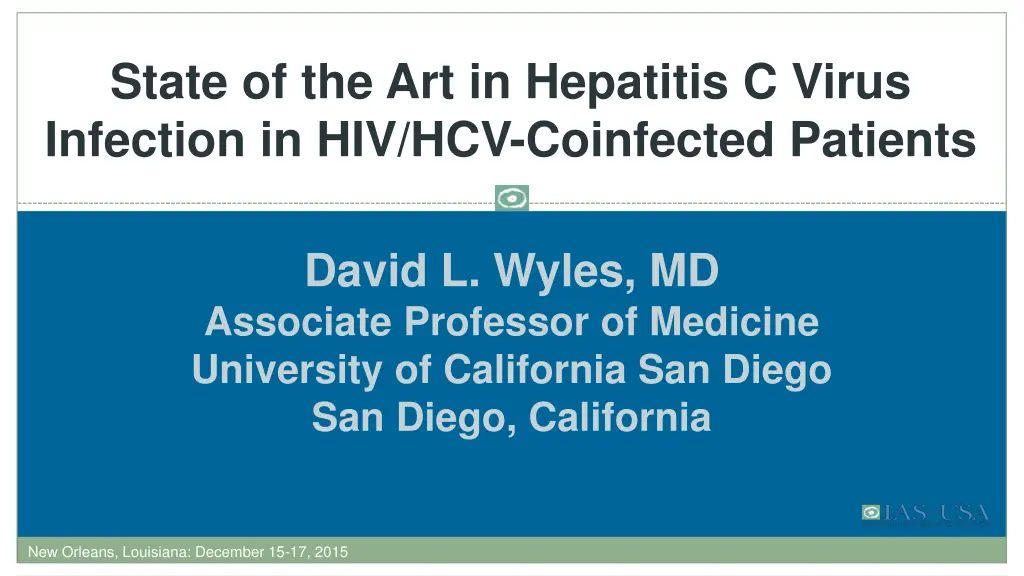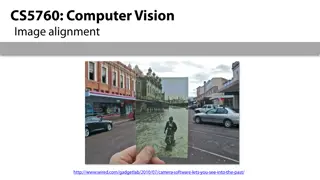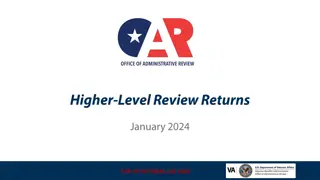
Insights into HIV/HCV Coinfection Treatment
Explore the latest advancements in managing hepatitis C virus infection in HIV/HCV-coinfected patients, including the impact of HIV treatment, the importance of HCV treatment regardless of coinfection status, and unique aspects in evaluating and treating coinfected individuals.
Download Presentation

Please find below an Image/Link to download the presentation.
The content on the website is provided AS IS for your information and personal use only. It may not be sold, licensed, or shared on other websites without obtaining consent from the author. If you encounter any issues during the download, it is possible that the publisher has removed the file from their server.
You are allowed to download the files provided on this website for personal or commercial use, subject to the condition that they are used lawfully. All files are the property of their respective owners.
The content on the website is provided AS IS for your information and personal use only. It may not be sold, licensed, or shared on other websites without obtaining consent from the author.
E N D
Presentation Transcript
State of the Art in Hepatitis C Virus Infection in HIV/HCV-Coinfected Patients David L. Wyles, MD Associate Professor of Medicine University of California San Diego San Diego, California FORMATTED: 11/17/15 New Orleans, Louisiana: December 15-17, 2015
Slide 2 of 36 HIV treatment does not completely abrogate the negative effect ART decreases hepatic decompensation events: 0.72 (0.54-0.94). Lo Re V. Ann Intern Med 2014. Anderson JP. CID 2014.
Slide 3 of 36 Treating HCV is a good thing whether you are co-infected or not. SVR vs. non-SVR Hill A. AASLD 2014.
Slide 4 of 36 Unique Aspects in the Evaluation of the Co-Infected Patient A detailed ART history is critical Regimens, virologic failures (How likely is an M184V?) Resistance genotypes when available Role for Archive resistance testing? HIV VL as a built in measure of adherence of course, you can still be fooled Staging- the options are the same Required for medication approval FIB-4 evaluated in co-infection (Berenguer J. CID 2015) >3.25 suggestive of advanced fibrosis ATV can impact directed biomarker tests Know when to refer and don t forget HCC screening!
Slide 5 of 36 Treatment na ve GT1 Recommended SOF/LDV OBV/PTV/r+DSV SOF/SMV SOF/DCV Non- cirrhotic + RBV 12 wks 12 wks 12 wks 12 wks GT1a +RBV 24 wks 24 wks* (RBV) 24 wks ( Cirrhosis 12 wks Non- cirrhotic 12 wks 12 wks 12 wks 12 wks GT1b 24 wks ( 24 wks ( Cirrhosis 12 wks 12 wks * Unclear role of Q80K testing. hcvguidelines.org
Slide 6 of 36 Treatment experienced GT1 Cirrhosis status Failed SOF/LDV PrOD (1a/1b) SOF+SMV SOF+DCV NC 12 12+R/12 12 12 PEG/RBV 12 + R or 24 24+R/12# 24 (RBV)* C 24 (RBV) NR NR NC 12 12 PEG/RBV + PI 12 + R or 24 NR NR C 24 (RBV) NC 12 (+R) 12+R/12 12 12 (+R) PEG/RBV + SOF (or SOF/RBV) 12 + R or 24 24+R/12# 24 (RBV)* C 24 (RBV) #TURQ-III: 100% SVR12 in GT1b without RBV (n=60) Feld JJ. 15th ISHVLD 2015. *Role of Q80K unclear; associated with lower response rate with 12 weeks of therapy. hcvguidelines.org
Slide 7 of 36 GT2/3 Guideline Recommendations Option-1 Option-2 Option-3 SOF/RBV 12-16 wks SOF/DCV 12 wks GT3: Patients with cirrhosis are recommended to receive 24 weeks of SOF/DCV due to lower response with just 12 weeks pending additional data. Na ve -- GT2 SOF/DCV ( 24 weeks SOF/RBV 16-24 wks SOF/PEG/RBV 12 wks Exp SOF/RBV 24 wks (alternative) SOF/PEG/RBV 12 wks SOF/DCV 12-24 weeks Naive GT3 SOF/DCV ( 12-24 weeks SOF/PEG/RBV (12 wks) Exp hcvguidelines.org
Slide 8 of 36 Drug interaction scorecard SOF SOF/LDV SMV DCV PrO-D GZP/EBR RAL/DTG TDF HIV PI/EFV ( TDF) DCV 90mg SMV GZP ( TDF) EFV RLP RLP RAL/DTG *not studied, based on predicted interactions. ABC TDF DCV 30mg SMV GZP ATV/r ABC TDF SMV DRV GZP DRV/r DCV 30mg* SMV* GZP EVG/c/FTC/TDF EVG/c/FTC/TAF No data
Slide 9 of 36 Summary HCV treatment should be a priority in those with HIV Efficacy is not an issue when considering treatment for HCV in those with HIV I would not use 8 weeks in those with HIV Keep a Pharmacist close by drug interactions are the major consideration Carefully review HIV treatment history before switching to accommodate HCV therapy Re-infection can and will happen counsel your patients on re-infection risks.






















